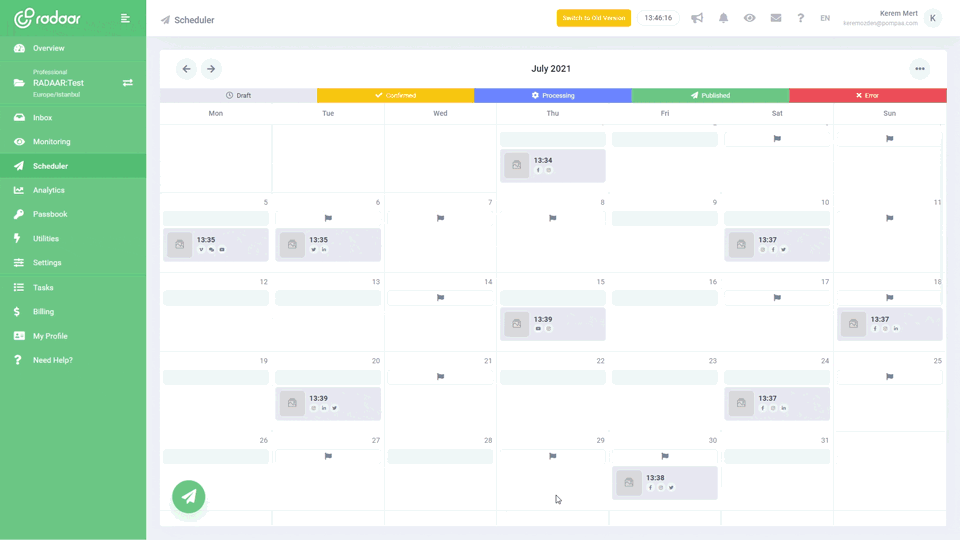Ever wondered how to sift through Google reviews using keywords and names?
Discover the secret to effortlessly navigating Google reviews by using targeted keywords and names, transforming overwhelming feedback into valuable insights. Dive into our latest blog post to learn practical techniques for streamlining your review search process today!
LEARN MORE LAUNCH DEMO NOW In a world where digital footprints are as telling as the conversations we once had over a neighborly fence, Google reviews have emerged as a powerful tool for both consumers and businesses alike. Yet, with the overwhelming influx of content flooding the internet every day, finding the right information when sifting through reviews can feel a bit like searching for a needle in a haystack. Have you ever wondered how to zero in on the most relevant testimonials about a business, while filtering out the noise? Whether you’re a savvy shopper looking for the best local coffee shop or a business owner keen to understand customer feedback, mastering the art of using keywords and names in Google reviews is a skill worth having.
Navigating through Google reviews by leveraging strategic keywords and names not only saves time but also enhances the quality of information you gain. Imagine being able to quickly find reviews that specifically mention elements important to you, whether that's stellar customer service, a favorite dish, or even a standout employee. This can be particularly beneficial for those wanting to uncover trends and insights that would otherwise be buried under a mountain of less relevant information. In this post, we'll guide you through practical steps to transform your review-sifting processes using smart search methods, making your review exploration both efficient and insightful. So, grab a cup of your favorite brew and settle in, because we’re about to unlock the hidden gems within Google reviews, one keyword at a time.
Navigating through Google reviews by leveraging strategic keywords and names not only saves time but also enhances the quality of information you gain. Imagine being able to quickly find reviews that specifically mention elements important to you, whether that's stellar customer service, a favorite dish, or even a standout employee. This can be particularly beneficial for those wanting to uncover trends and insights that would otherwise be buried under a mountain of less relevant information. In this post, we'll guide you through practical steps to transform your review-sifting processes using smart search methods, making your review exploration both efficient and insightful. So, grab a cup of your favorite brew and settle in, because we’re about to unlock the hidden gems within Google reviews, one keyword at a time.
Table of Contents
- What are the basic principles of searching Google reviews?
- How to get started with keyword searches in reviews?
- What is the proper way to utilize name searches?
- Why should you use specific keywords in your search?
- How to find relevant results from massive reviews?
- Can efficient search strategy improve your decision-making?
- What are the real-life implications of your search?
- What are the do’s and don’ts of searching Google reviews?
- Ready to navigate Google reviews like a pro with these tips?
What are the basic principles of searching Google reviews?
When searching through Google reviews, a few basic principles can make your task easier and more efficient. First, utilize specific keywords related to your interest to quickly filter through large volumes of feedback; this can mean the difference between a fruitful search and a frustrating one. Next, familiarize yourself with the search feature on Google's review platform, which often allows for sorting by date, relevance, or star rating—this can help you pinpoint the most recent and pertinent comments. Lastly, don't overlook the use of names or direct references if you're seeking opinions about specific staff or individuals, as these searches can provide a more personalized insight into customer experiences.
How to get started with keyword searches in reviews?
Getting started with keyword searches in reviews is easier than you might think. First, identify the specific words or phrases that are most relevant to what you're searching for—these could be related to the product, service, or even specific experiences like "customer service" or "cleanliness." Next, use these keywords in the search bar within the Google Reviews section, which will filter reviews containing your chosen terms, making it simpler to sift through the ones that matter most to you. By focusing your search in this way, you'll quickly uncover the insights you need to make informed decisions or enhance your understanding of what others have experienced.
What is the proper way to utilize name searches?
Utilizing name searches when sifting through Google reviews is both an art and a science, and mastering it can significantly enhance your ability to glean useful insights. Start by entering the specific name of the individual or business entity you are interested in, enclosed in quotation marks. This helps filter out irrelevant content, ensuring that your results are more targeted and precise. For best results, try combining the name with other specific keywords related to your interest, such as "customer service" or "product quality," which can reveal patterns in feedback or highlight specific areas of concern.
Once you have your results, take the time to thoroughly read the reviews that mention the name you searched. Pay attention not only to the content of the reviews but also to the tone and context. This can help you discern whether the mentions are positive, negative, or neutral, which is critical for forming a balanced understanding. Additionally, consider the frequency of the name's appearance in reviews; frequent mentions may indicate a strong impact on customer experience, whether beneficial or adverse. With these strategies, name searches become a potent tool in your arsenal for navigating the vast expanse of Google reviews.
Once you have your results, take the time to thoroughly read the reviews that mention the name you searched. Pay attention not only to the content of the reviews but also to the tone and context. This can help you discern whether the mentions are positive, negative, or neutral, which is critical for forming a balanced understanding. Additionally, consider the frequency of the name's appearance in reviews; frequent mentions may indicate a strong impact on customer experience, whether beneficial or adverse. With these strategies, name searches become a potent tool in your arsenal for navigating the vast expanse of Google reviews.
Why should you use specific keywords in your search?
Using specific keywords in your Google reviews search can save you both time and effort by quickly guiding you to the most relevant and helpful reviews. Instead of sifting through countless reviews, keywords help narrow down the results to those that specifically mention the aspects you're interested in, such as "customer service" or a particular product feature. This focused approach allows you to make more informed decisions based on the experiences and opinions of others who have encountered similar interests or concerns. Additionally, using names in your search can surface particular experiences linked to specific employees or businesses, providing a more personalized insight into the service quality.
How to find relevant results from massive reviews?
Sifting through a sea of Google reviews to find relevant results can be like searching for a needle in a haystack, but honing in on specific keywords and names can streamline the process significantly. Start by using the search function within the reviews section, typing in specific words that are most relevant to your interests or concerns, such as "customer service," "John," or "delicious." This will filter the results, showing only those reviews that mention your chosen keywords, helping you zero in on what really matters to you. Additionally, sorting the reviews by star rating or date can provide further context, ensuring not only comprehensive but also timely insights to inform your decisions.
Can efficient search strategy improve your decision-making?
An efficient search strategy can significantly enhance your decision-making by cutting through the noise and honing in on the information that truly matters. Whether you're searching for the best restaurant in town or contemplating a new tech gadget, leveraging keywords and names within Google reviews can streamline this process. By identifying specific terms related to your interests or concerns, you target reviews that address your particular needs—saving both time and mental energy. This focused approach doesn't just offer relevant insights but also helps prevent the overwhelm that often accompanies pages of mixed feedback.
Furthermore, an effective search strategy equips you with the ability to make informed choices quickly. By filtering reviews using the right keywords, you can easily spot trends in customer feedback and draw conclusions based on consistent patterns. Say you're deciding whether to book a hotel; seeing recurring mentions of "clean rooms" or "excellent service" can instill confidence in your choice. In contrast, repeated notes on poor Wi-Fi or unhelpful staff could be red flags. An optimized search not only simplifies the decision-making process but also empowers you to align your choices with your preferences and priorities, leading to more satisfying outcomes.
Furthermore, an effective search strategy equips you with the ability to make informed choices quickly. By filtering reviews using the right keywords, you can easily spot trends in customer feedback and draw conclusions based on consistent patterns. Say you're deciding whether to book a hotel; seeing recurring mentions of "clean rooms" or "excellent service" can instill confidence in your choice. In contrast, repeated notes on poor Wi-Fi or unhelpful staff could be red flags. An optimized search not only simplifies the decision-making process but also empowers you to align your choices with your preferences and priorities, leading to more satisfying outcomes.
What are the real-life implications of your search?
Searching Google reviews using keywords and names can greatly impact everyday decision-making, making it easier for consumers to find businesses that meet their specific needs. By honing in on precise criteria, you can quickly locate reviews about a restaurant's famous pizza, a particular stylist at a salon, or the customer service at a local car dealership. This streamlined review-hunting not only saves time but also boosts confidence in your choices by providing targeted insights from real customers. Ultimately, this approach enhances your shopping experience, helping you make more informed and satisfying purchase decisions.
What are the do’s and don’ts of searching Google reviews?
When sifting through Google reviews using keywords and names, it's essential to follow a few do's and don’ts to maximize your search efficiency. Do use specific and relevant keywords that align with what you're looking for, such as the product features, service quality, or a particular employee name. However, don’t rely too heavily on vague or common terms, as this can lead to sifting through too many irrelevant reviews, making your search more cumbersome. Lastly, do check for recent reviews to get the most current insights, but don’t overlook older reviews that might provide a historical perspective on consistent trends or issues.
Ready to navigate Google reviews like a pro with these tips?
Navigating Google reviews like a pro can be a game-changer for making informed decisions, whether you're choosing a new restaurant, booking a hotel, or scoping out local services. With the tips and strategies provided in this guide, you're now equipped to efficiently sift through countless reviews by utilizing keywords and names that hone in on what's truly important to you. Remember, the key lies in refining your search terms and being specific about what you're looking for, which will lead you to the most relevant and helpful insights. By smartly leveraging Google’s vast array of user-generated reviews, you ensure your decisions are based on the collective wisdom of the community.
Moreover, these tips not only enhance your search efficiency but also help you become a more discerning consumer. You can quickly identify patterns and recurring themes in reviews, allowing you to sift fact from emotion-driven opinions. Keep sharpening your skills by experimenting with various keywords and techniques as you navigate Google reviews, and watch your decision-making process become even more precise and confident. So, the next time you're faced with a crucial choice, dive into Google reviews armed with these tools, and emerge with the knowledge of an expert evaluator.
Moreover, these tips not only enhance your search efficiency but also help you become a more discerning consumer. You can quickly identify patterns and recurring themes in reviews, allowing you to sift fact from emotion-driven opinions. Keep sharpening your skills by experimenting with various keywords and techniques as you navigate Google reviews, and watch your decision-making process become even more precise and confident. So, the next time you're faced with a crucial choice, dive into Google reviews armed with these tools, and emerge with the knowledge of an expert evaluator.
SOCIAL MEDIA SCHEDULER
Plan and publish...
Plan and publish your content for Facebook, Instagram, Twitter, and LinkedIn from one simple dashboard.
LEARN MORE FREQUENTLY ASKED QUESTIONS
What is social media management platform?
RELATED BLOG POSTS
All the tips & tricks you'll need...
Get the fresh tips and tricks you'll need to ace social media marketing.












